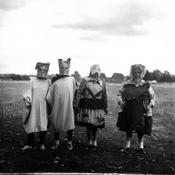2636 episódios
- “The Further Adventures of Robinson Crusoe; Being the Second and Last Part of his life, And of the Strange Surprizing Accounts of his Travels Round three Parts of the Globe.”
After the death of his wife, Robinson Crusoe is overcome by the old wanderlust, and sets out with his faithful companion Friday to see his island once again. Thus begins a journey which will last ten years and nine months, in which Crusoe travels over the world, along the way facing dangers and discoveries in Madagascar, China, and Siberia.
Advertising Inquiries: https://redcircle.com/brands
Privacy & Opt-Out: https://redcircle.com/privacy - “The Further Adventures of Robinson Crusoe; Being the Second and Last Part of his life, And of the Strange Surprizing Accounts of his Travels Round three Parts of the Globe.”
After the death of his wife, Robinson Crusoe is overcome by the old wanderlust, and sets out with his faithful companion Friday to see his island once again. Thus begins a journey which will last ten years and nine months, in which Crusoe travels over the world, along the way facing dangers and discoveries in Madagascar, China, and Siberia.
Advertising Inquiries: https://redcircle.com/brands
Privacy & Opt-Out: https://redcircle.com/privacy - “The Further Adventures of Robinson Crusoe; Being the Second and Last Part of his life, And of the Strange Surprizing Accounts of his Travels Round three Parts of the Globe.”
After the death of his wife, Robinson Crusoe is overcome by the old wanderlust, and sets out with his faithful companion Friday to see his island once again. Thus begins a journey which will last ten years and nine months, in which Crusoe travels over the world, along the way facing dangers and discoveries in Madagascar, China, and Siberia.
Advertising Inquiries: https://redcircle.com/brands
Privacy & Opt-Out: https://redcircle.com/privacy - “The Further Adventures of Robinson Crusoe; Being the Second and Last Part of his life, And of the Strange Surprizing Accounts of his Travels Round three Parts of the Globe.”
After the death of his wife, Robinson Crusoe is overcome by the old wanderlust, and sets out with his faithful companion Friday to see his island once again. Thus begins a journey which will last ten years and nine months, in which Crusoe travels over the world, along the way facing dangers and discoveries in Madagascar, China, and Siberia.
Advertising Inquiries: https://redcircle.com/brands
Privacy & Opt-Out: https://redcircle.com/privacy - “The Further Adventures of Robinson Crusoe; Being the Second and Last Part of his life, And of the Strange Surprizing Accounts of his Travels Round three Parts of the Globe.”
After the death of his wife, Robinson Crusoe is overcome by the old wanderlust, and sets out with his faithful companion Friday to see his island once again. Thus begins a journey which will last ten years and nine months, in which Crusoe travels over the world, along the way facing dangers and discoveries in Madagascar, China, and Siberia.
Advertising Inquiries: https://redcircle.com/brands
Privacy & Opt-Out: https://redcircle.com/privacy
Mais podcasts de Arte
Podcasts em tendência em Arte
Sobre Great Audiobooks
100 Great Audiobooks of Literary Masterpieces!
Sítio Web de podcastOuve Great Audiobooks, O Homem Que Comia Tudo e muitos outros podcasts de todo o mundo com a aplicação radio.pt

Obtenha a aplicação gratuita radio.pt
- Guardar rádios e podcasts favoritos
- Transmissão via Wi-Fi ou Bluetooth
- Carplay & Android Audo compatìvel
- E ainda mais funções
Obtenha a aplicação gratuita radio.pt
- Guardar rádios e podcasts favoritos
- Transmissão via Wi-Fi ou Bluetooth
- Carplay & Android Audo compatìvel
- E ainda mais funções


Great Audiobooks
Leia o código,
descarregue a aplicação,
ouça.
descarregue a aplicação,
ouça.



































